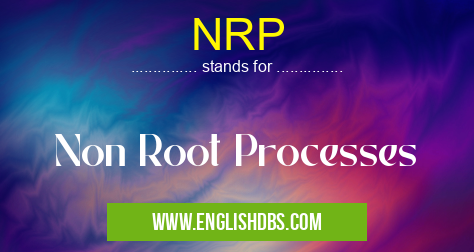What does NRP mean in UNCLASSIFIED
NRP refers to processes that are not running with root privileges. In computing, root is the highest level of user access, allowing unrestricted control over the system. Non-root processes operate with limited permissions, which enhances system security by preventing malicious software and unauthorized users from gaining elevated privileges.

NRP meaning in Unclassified in Miscellaneous
NRP mostly used in an acronym Unclassified in Category Miscellaneous that means Non Root Processes
Shorthand: NRP,
Full Form: Non Root Processes
For more information of "Non Root Processes", see the section below.
Introduction: NRP stands for Non Root Processes
Key Points
- Importance: Running processes as NRP limits their ability to modify critical system files, access sensitive data, or execute potentially harmful commands.
- Enhanced Security: By restricting process permissions, NRP helps mitigate security risks, preventing unauthorized access and system compromise.
- Process Isolation: NRP ensures that each process operates in a sandboxed environment, reducing the impact of potential vulnerabilities on other processes and the overall system.
- Resource Management: Non-root processes cannot access or allocate system resources beyond their assigned limits, promoting efficient resource utilization.
Essential Questions and Answers on Non Root Processes in "MISCELLANEOUS»UNFILED"
What are NRP (Non Root Processes)?
NRP or Non Root Processes are operating system processes that do not require elevated privileges or root access to execute. They run under the authority of a non-privileged user account, limiting their ability to make system-wide changes or access sensitive information.
Why are NRP important?
NRP are crucial for maintaining system security and stability. By restricting the privileges of processes, they prevent malicious actors from gaining control of the system and causing damage. Additionally, NRP reduce the attack surface by limiting the number of processes that can be targeted by exploits.
How can I identify NRP?
NRP can be identified by checking the "Effective UID" (EUID) field in the process table. A non-zero EUID indicates that the process is not running as the root user. Alternatively, you can use tools like "ps -ef" or "top" to filter processes by their EUID.
What are the benefits of using NRP?
Implementing NRP offers several benefits, including:
- Enhanced security by reducing the attack surface and preventing privilege escalation.
- Improved stability by limiting the impact of process failures on the system.
- Simplified management by removing the need to grant elevated privileges to processes.
What are the challenges of implementing NRP?
Implementing NRP can present some challenges, such as:
- Legacy applications may require root privileges to function, necessitating refactoring or modifications.
- System administration tasks may become more complex as additional steps are required to grant temporary privileges.
Final Words: NRP is a crucial aspect of system security, providing a layer of protection against unauthorized access and malicious activity. By running processes with limited permissions, NRP helps maintain the integrity and stability of computing environments. It is an essential practice for organizations and individuals seeking to safeguard their systems and data.
NRP also stands for: |
|
| All stands for NRP |
